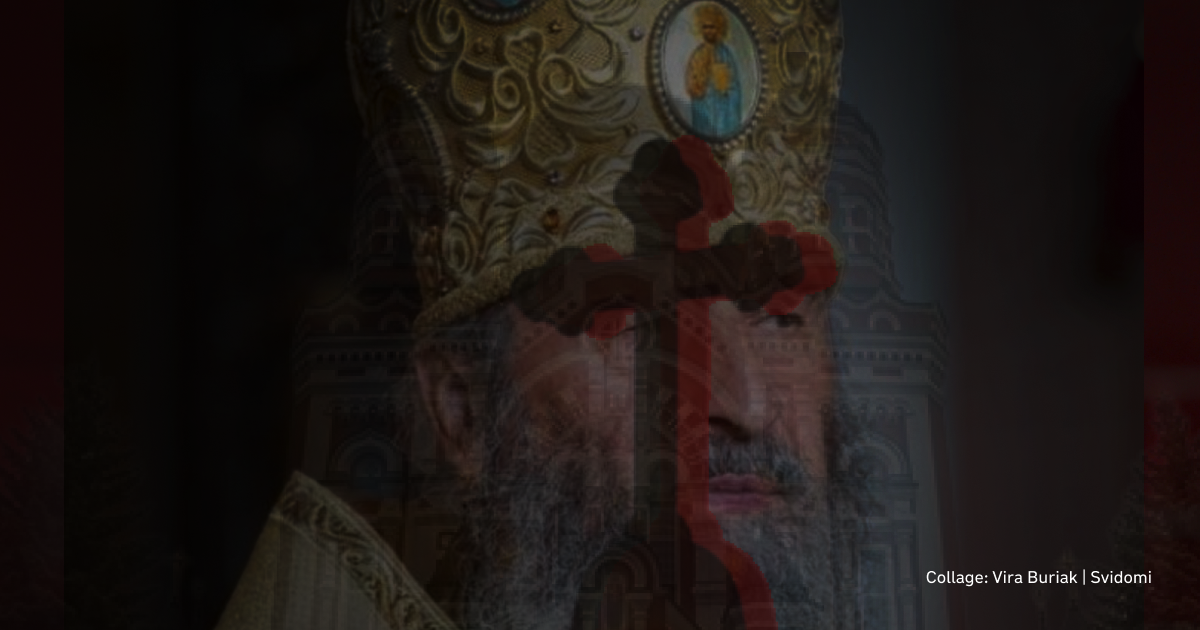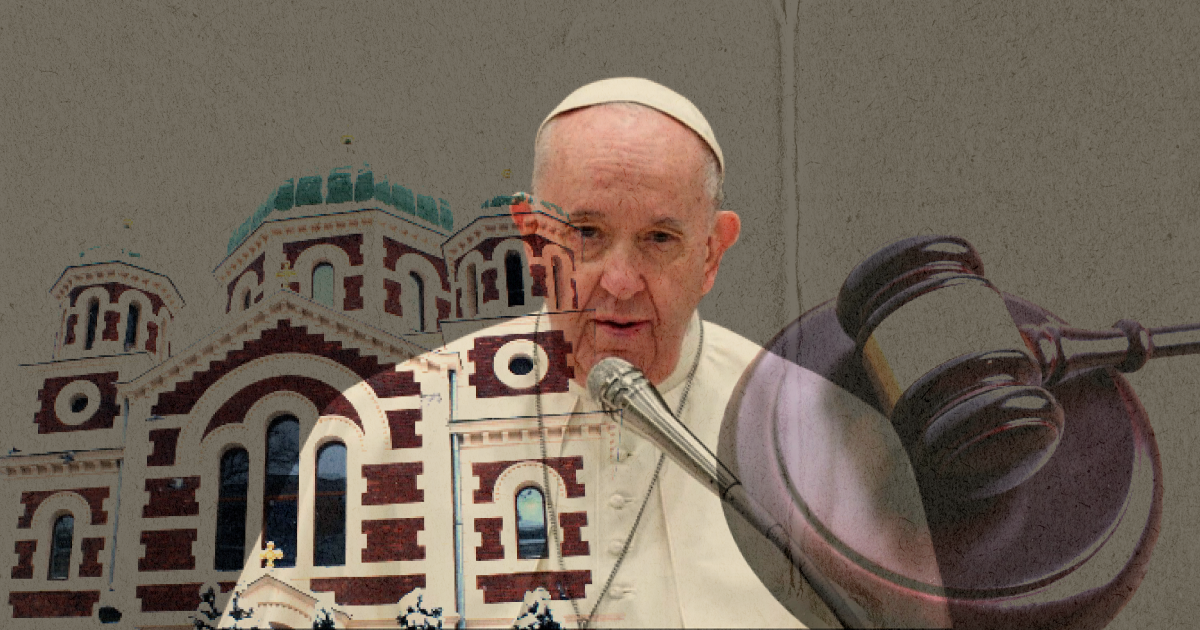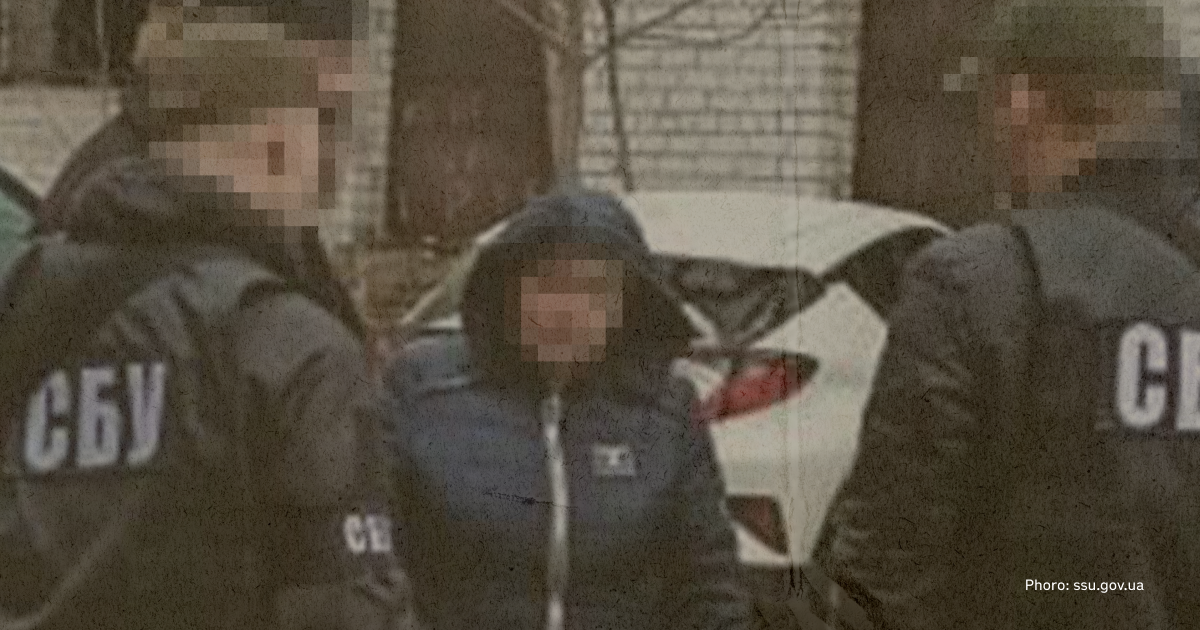Banning of the Ukrainian Orthodox Church of the Moscow Patriarchate (UOC-MP) in Ukraine. Why and what's next?
Ustym Podola

On August 24, President of Ukraine Volodymyr Zelenskyy signed a draft law banning the activities in Ukraine of religious organisations with links to Russia. Now, the UOC-MP has nine months to sever ties with the Russian Orthodox Church.
Instead, in a commentary for Hromadske, UOC-MP Metropolitan Klyment said that the UOC-MP continues to serve as a 'true church' recognised by the faithful and that an attempt to ban it will only lead to international discredit for Ukraine.
Svidomi explains how this law will affect the UOC-MP, why it is essential, and the pitfalls Ukraine will face in implementing it.
History of the UOC-MP in Ukraine
"After the First World War and the proclamation of the Ukrainian People's Republic and the Western Ukrainian People's Republic, the Russian Church in Ukraine was in a precarious position. Recognising this, the bishops of the Russian Church in Ukraine proclaimed a kind of technical autocephaly. In other words, this Church was to become independent of the Russian centre, but only on paper. As soon as it became possible to restore this link, they did so," a researcher at the Institute of Church History at the Ukrainian Catholic University, Anatolii Babynskyi, told Priamyi TV.
"This is a very well-thought-out mechanism. The UOC-MP was created in 1990. It would be illogical for the Russian Orthodox Church to operate in Ukraine against the background of independence, church revival and Ukrainian parishes coming out of the underground. Anything Russian would have no chance of taking root. Accordingly, the Russian Church (Russian Orthodox Church — ed.) operates within its jurisdiction. Geographically, it is in Russia. Meanwhile, the Ukrainian Orthodox Church of the Moscow Patriarchate is developing in Ukraine. Few common people cared whether it was the Kyiv Patriarchate or the Moscow Patriarchate. They made a very clever political move by creating a Ukrainian church in Ukraine but with links to this 'great mother church'. For 30 years, this move brainwashed the minds of Ukrainians and conveyed meanings beneficial to Moscow," says Roman Nazarenko, director of the Institute of Religion and Society at the Ukrainian Catholic University, in an interview with Svidomi.

Since the days of Viktor Yanukovych's presidency (the fourth president of Ukraine from 2010 to 2014 — ed.), the so-called 'religious favouritism' has begun. Previously, presidents did not attach importance to religion. With the arrival of Yanukovych, the favouritism of the UOC-MP began. It didn't become a state church, but, let's say, it began to be associated with power and respectability. It was fashionable, as Poroshenko exemplified (Petro Poroshenko, the fifth president of Ukraine from 2014 to 2019, had been a sexton and patron of the UOC-MP — ed.),
Nazarenko says about the further development of the UOC-MP.
Draft Law No. 8371
On August 20, the Verkhovna Rada of Ukraine adopted a draft law banning the activities of religious organisations in Ukraine with centres of influence in Russia. On August 22, the Speaker of the Verkhovna Rada of Ukraine, Ruslan Stefanchuk, signed this document, and on August 24 – the Independence Day of Ukraine – President Zelenskyy signed it. From that moment on, religious organisations have nine months to sever ties with their Russian centres.

The mechanism of this law is as follows: First, the competent authority will conduct the religious expertise of the organisations subordinated to the centres of influence in Russia. The religious organisation will be ordered to eliminate any violations. If the organisation fails to comply, a court application is filed to 'close' it. However, a religious organisation does not mean the entire UOC-MP, for example, but rather individual legal entities that represent it—each parish, diocese, etc., according to the ecclesiastical hierarchy.
"A church with a metropolis in Moscow is not really a church, but a branch of the Federal Security Service. And it can be closed by court order," says Iryna Herashchenko, co-chair of the European Solidarity faction in the Verkhovna Rada.
Is the UOC-MP an independent body from the Russian Orthodox Church?
"The Ukrainian Orthodox Church will continue to live as a true church, recognised by the vast majority of practising Ukrainian believers and local churches worldwide. This is an objective matter. Any attempt to ban an objective thing will only lead to discrediting, including international discrediting, of those who want to implement it in any way," said Metropolitan Klyment, head of the UOC-MP Information and Education Department, in a comment to Hromadske. He also noted that the UOC-MP has no legal ties with the Russian Orthodox Church and described such actions by the Ukrainian authorities as similar to those of the communist regime.
However, the conclusion of the religious expert of Ukraine's State Service for Ethnic Policy and Freedom of Conscience suggests otherwise:
"The relations between the UOC-MP and the Russian Orthodox Church are not those of an independent (autocephalous) church with another independent autocephalous church. Nor does the UOC-MP have the status of an autocephalous church recognised by other churches. Thus, the UOC-MP is a structural subdivision of the Russian Orthodox Church without its canonical subjectivity. The expert group members did not find any documents or actions indicating the transformation of the UOC-MP into a religious organisation independent of the Russian Orthodox Church."
Moreover, the UOC-MP has complicated relations with those churches that have established Eucharistic communion with the Orthodox Church of Ukraine. In particular, it has broken off Eucharistic communion with the Churches of Constantinople, Alexandria, Cyprus and Greece following the Russian Orthodox Church. No other Church, except the Russian Orthodox Church, has done so. Moreover, all the bishops of the UOC-MP remain members of the highest governing bodies of the Russian Orthodox Church, local and bishops' councils, and are obliged to participate in their work.

“Now they want to sit on two chairs: on the one hand, they want to get rid of Russia; on the other hand, they do not want to transfer to the Orthodox Church of Ukraine and remain a kind of separate entity," says religious scholar Roman Nazarenko.
UOC-MP as a threat to national sovereignty
Despite the UOC-MP's formal condemnation of Russian aggression, this church is a threat to Ukraine's independence.
"Since the beginning of Russia's full-scale invasion, criminal cases have been opened against more than 100 clergymen of the UOC-MP based on materials from the Security Service of Ukraine. Almost 50 of them have already been notified of suspicion, and 26 have received court sentences," the Security Service of Ukraine said in a comment to Suspilne.
Among the most well-known cases are the abbot of the Sviatohirsk Lavra, Metropolitan Arsenii, and the abbot of the Kyiv-Pechersk Lavra, Metropolitan Pavlo. Arsenii is accused of revealing to the faithful during services the location of checkpoints and units of the Armed Forces, the Security Service of Ukraine, the National Police and the Defence Forces of Ukraine on the territory of the Sviatohirsk community, which is a criminal offence (Article 114-2 of the Criminal Code of Ukraine). Metropolitan Pavlo is accused by the Security Service of Ukraine of justifying and denying the armed aggression of the Russian Federation against Ukraine (Article 161 of the CCU), as well as violating the equality of citizens based on their racial, national and regional affiliation (Article 436-2 of the CCU).
Moreover, a religious structure belonging to the Russian Orthodox Church challenges national sovereignty since "the ROC is a political instrument of religious influence in the hands of the state," says Roman Nazarenko. "The Russian Church supports the vector of activity set by Putin. This is even though its activities contradict the principles and morals which the Christian community should apply. In addition to the anti-Ukrainian rhetoric, there is much evidence of links with Russia in the churches of the UOC-MP. This confirms that the parishes of the UOC-MP were just branches of the Russian Orthodox Church in Ukraine, which were supposed to "spread Russian narratives".

The narratives of the Russian Orthodox Church are openly stated by the UOC-MP in the decree of the XXV World Russian People's Church Council, "The Present and Future of the Russian World", held in Moscow in March this year. This text was written on the ideas and under the chairmanship of Patriarch Kirill of the Russian Orthodox Church. This 'church' recognises the so-called 'special military operation' as Russia's holy war for the 'right to live on its own land'. This duplicates Putin's narrative of the 'Holy Trinitarian Rus', in which the Russian world's borders extend beyond the Russian Federation's territorial limits alone.
"After the end of the special military operation, the entire territory of modern Ukraine should become the zone of Russia's exclusive influence. The possibility of the existence on this territory of a Russophobic political regime hostile to Russia and its people, as well as a political regime controlled from an external centre hostile to Russia, should be completely excluded," the text of the document reads.
In this document, Patriarch Kirill also highlighted other, more mundane issues. These include demography, foreign and migration policy, economic development, education, and urbanism.
What problems may arise in the process of banning the UOC-MP?
Foremost, the UOC-MP is a large structure in Ukraine with over 8,000 parishes and over 9,000 priests and monks. The Orthodox Church of Ukraine has the same number of parishes but half as many clergy. At the same time, 4% of Ukrainians consider themselves parishioners of the UOC-MP, and 41% of Ukrainians consider themselves members of the OCU, according to a nationally representative survey conducted by Info Sapiens.
This raises two questions. First, there is the difficulty of transferring all UOC-MP parishes to the OCU along with the same UOC-MP priests. This is similar to the reform of the police or judiciary. Secondly, it could create numerous criminal cases that the Ukrainian legal system cannot handle.
While the first question remains open, the Verkhovna Rada Committee on Humanitarian and Information Policy head, Mykyta Poturaiev, answers the second in a commentary to Interfax-Ukraine: "Obviously, the ties are centred at the top. The main centre of ties and practical implementation is the top levels of the hierarchy. We never planned to file eight thousand lawsuits in nine months... The dotting the i's and crossing the t's should start where the power in this church is focused — at the top, and move down."

However, there is an international dimension to the problems that the ban on the UOC-MP may generate. Religious scholar Roman Nazarenko believes that this case requires caution.
"We need to do this exclusively legally. This is a hazardous issue. They (Russia - ed.) show the Security Service of Ukraine searches in churches in a favourable light. This has a direct impact on the opinion of the international community. You cannot round them up (the clergy of the UOC-MP — ed.) and forcibly take them away. I understand that you want to take that church and just close it. However, 20 seconds after such a step, in different EU countries, the front pages will be full of photos of our ‘special forces’ restraining Moscow priests. Religion is very important in the US and Europe. Therefore, it can affect the supply of weapons and attitudes towards the government and the entire state. This issue needs to be addressed decisively but very delicately.
We need to avoid the possible narrative that Ukraine persecutes people based on religious grounds. This is the idea that Russians present when talking about Ukraine. We need to emphasise that everyone in Ukraine has the right to freely practice their religion. That's it. The following is true: regardless of whether it is a priest of the UOC-MP, an imam, a rabbi, or a Buddhist monk. They must be held accountable before the law if they pursue an anti-state policy. That's all."
Russian propaganda is already using these narratives. On August 27, President of Ukraine Volodymyr Zelenskyy emphasised that the negative reaction of the Vatican and Pope Francis on August 25 to the law banning the activities of religious organizations associated with the Russian Federation in Ukraine demonstrates the need to strengthen Kyiv's work in the global information space.
“It is important not to lose contact with the Vatican, Italy, or the information space of the whole of Europe and the United States,” Zelenskyy said, commenting on the Vatican's position and answering whether international partners understand that it is not about the church as such, but about the zone of influence of the Russian Federation in Ukraine.
Nazarenko, a religious scholar, talks about another problem with the law banning the Russian Orthodox Church:
"The state should not close or ban certain churches. Otherwise, tomorrow, another government will come (nominal Arestovych) and ban the Ukrainian Greek Catholic Church. They will change the law, and the deputies will vote in favour. And then what?
In the case of the UOC-MP, we have to put it in the canonical line. The Ukrainian Orthodox Church of the Moscow Patriarchate is not in the Diptych (a list of all Orthodox autocephalous churches recognised in the Orthodox world). So, it has to decide how it positions itself. Either you become equal to the Russian Orthodox Church, which is present in the Diptych and recognised by the Orthodox world, and officially declare your activities. Or you accept the offer of Ukrainian Orthodoxy. This is where Epifaniy should enter into a dialogue. In this way, the OCU can claim: "The UOC-MP does not exist in the Diptych. There is the ROC, and after the Tomos is granted, there is also the Orthodox Church of Ukraine. Choose: "There and feel free, " or "here and feel free."
This, by the way, is what made the Tomos important. Otherwise, these questions would not arise today. We cannot raise the issue of the Orthodox Church, which is not canonically recognised. Receiving the Tomos allowed us to speak from a position of strength towards Russian Orthodoxy in Ukraine."
Why is the abolition of the UOC-MP important for Ukraine?
In December 2023, the SSU detained a choir member and the wife of the rector of a local UOC-MP church in Zaporizhzhia. She was adjusting Russian missile attacks that were trying to hit the Defence Forces' bases near the regional centre and was awaiting the complete occupation of the region by Russian troops.
Meanwhile, more than one and a half million Ukrainians continue to be parishioners of the UOC-MP. That is 4% of Ukraine's 37 million population in 2024, according to the UN. More than one and a half million narratives from the Kremlin still influence Ukrainians. If this communication channel with Moscow is not cut, it will significantly impact Ukraine's security.
"I imagine Russia as a three-headed monster. One head is the church, the second is the army, and the third is propaganda. We hit the first with the Tomos and this law. The Ukrainian army has been cutting off the second. Thanks to projects like yours, we are raising awareness, fighting Russian propaganda and destroying the third," says Roman Nazarenko.


